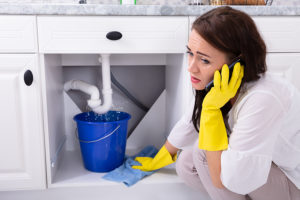What To Do In A Plumbing Emergency
 Indoor plumbing is one of the great, underrated inventions of modern life. Without it, we’d have to leave our homes or workplaces to wash our hands, laundry, dishes, take showers or bathe, or even urinate or empty our bowels. That’s why it’s critical, when something goes wrong, to get things fixed quickly.
Indoor plumbing is one of the great, underrated inventions of modern life. Without it, we’d have to leave our homes or workplaces to wash our hands, laundry, dishes, take showers or bathe, or even urinate or empty our bowels. That’s why it’s critical, when something goes wrong, to get things fixed quickly.
But while some plumbing issues, such as a leaky faucet, can be fixed the next or even the next week, some issues need immediate attention. Here’s what to do if you have an emergency plumbing situation.
Turn Off The Water
If the culprit in the emergency is a burst pipe, then one of the first things to do is go to your water supply and turn it off. Because this is in the Long Island area, the water supply here is provided mainly by the city, so most people can turn off the water by finding the valve in their own home and closing it to the off position.
Shutting off the water supply prevents additional damage—particularly water damage—from occurring in the structure. Sometimes doing this within an hour, or better yet, a few minutes can mean the difference between hundreds and thousands of dollars of additional damage.
Turn Off The Water Heater
If you’ve turned off the water throughout a home or building, then the water heater should be next on the list. Depending on the type of water heater and the age of your plumbing, shutting off the water without shutting off the water heater could lead to an increased risk of damage. Heat can build up in the water heater itself, leading to a possible burst.
If your water heater burns natural gas, this often means turning off the gas too. On the other hand, if you’re using a tankless water heater in your building, this won’t be such a big issue.
Carefully Clean Messes
A lot depends on the kind of leakage you encounter. Water in a kitchen sink not draining is very different from a backed-up toilet or, worse yet, backed up sewage line where the street’s waste is coming into a building.
If you have waste from a toilet or sewer backing up into a building, take all health and safety precautions. Human and animal waste flushed down a toilet are full of microbes that can make a person sick just by making physical contact with skin. This means such a mess can present a health hazard to both people and animals in a home or other building, so the mess should be cleaned up as quickly as possible. However, do this carefully, gloves and other protective gear to prevent contact and possible infection from contagions in the waste.
Make The Call & Listen
Of course, the final step you should take is to call a professional plumber. A 24-hour plumber or another emergency plumber should be your first call. Once you’ve made contact and explained the situation, the next important step is to listen to their advice. They may give you some quick tips on how you can mitigate the mess and damage until they arrive.
If you have a plumbing emergency and need a prompt, professional response, we can help. Contact us today, and let our experienced team resolve your situation.
